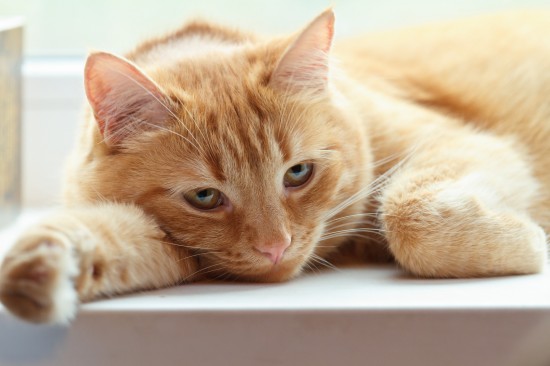Heartworm is a well known problem for dogs. However our cats are all too often neglected. Cat heartworm disease is on the increase too and can be just as serious. Make sure you know if your feline friend is at risk.
Heartworm disease is caused by a parasitic worm Dirofilaria immitis which is designed to live part of its life inside a female mosquito and the remainder inside any canine. As one dog is infected, immature worms are picked up by mosquitoes only to be passed onto another canine as they develop. This means the disease can be very widespread in domesticated and wild canines, dogs, foxes, coyotes and wolves wherever mosquitoes live. The longer the mosquito season the more prevalent heartworm disease is.
Although heartworm have evolved to co-exist with dogs they often survive in cats too. As the disease becomes more common in the dog population, more mosquitoes carry the larvae and pass them onto other animals including cats.
Over the last twenty years, as preventative heartworm medicine has become more available more dog owners take the FDA recommended precaution of regularly giving pets such a product. Until very recently very little research had been carried out into how common heartworm disease is for cats. It seems that feline asthma and bronchitis, relatively common diagnosis's for cats with breathing problems may actually have been misdiagnosed cases of heartworm disease. As cats are not the traditional host, they do not show all the same symptoms or even signs of the disease as dogs. Often there are no larvae in the blood stream which is the simplest way to test for the problem, and the adult worms may congregate in the lungs or other organs as opposed to the heart.
Estimates for the number of cats infected with heartworm disease vary wildly but all concerned bodies such as the Heartworm Society, FDA and Veterinary Associations agree the problem is growing. Some cats will fight off infections relatively easily, while the next may suddenly die from only one adult heartworm. The results of the disease are extremely erratic. Many of the effective treatments given to infected dogs are not suitable for cats so treatment is often more of a 'watch and see' variety.
The good news is that, although there are fewer products available it is now possible to give your cat preventative heartworm medicine. A monthly dose will stop your cat becoming infected with this life-threatening condition. You will be faced with a minimal regular payment rather than any huge and financially disruptive bills for expensive treatment in the future. Plus, by treating your cat with a preventative heartworm medication you help slow the spread of the disease to other animals, both domesticated and wild.
Speak to your Vet about the risk of this disease in your region and the options for treatment. No medication marketed for dogs should be administered to your cat as some of the parasitic agents commonly given to dogs are highly toxic and even potentially fatal to cats.

 How To Deal With Abscesses In Dogs
How To Deal With Abscesses In Dogs
 When Cats Are Sick Why Do They Hide Away?
When Cats Are Sick Why Do They Hide Away?
 Homemade Dog Deterrents That Are Safe For Your Dog
Homemade Dog Deterrents That Are Safe For Your Dog
 Christmas Presents for Dogs: Santa Paws is coming to Town!
Christmas Presents for Dogs: Santa Paws is coming to Town!
 6 Dog Breeds That Are Not The Best Choice For First-time Owners
6 Dog Breeds That Are Not The Best Choice For First-time Owners
 Your New Puppy - Development From Twelve Weeks Old To Adulthood
Your New Puppy - Development From Twelve Weeks Old To Adulthood